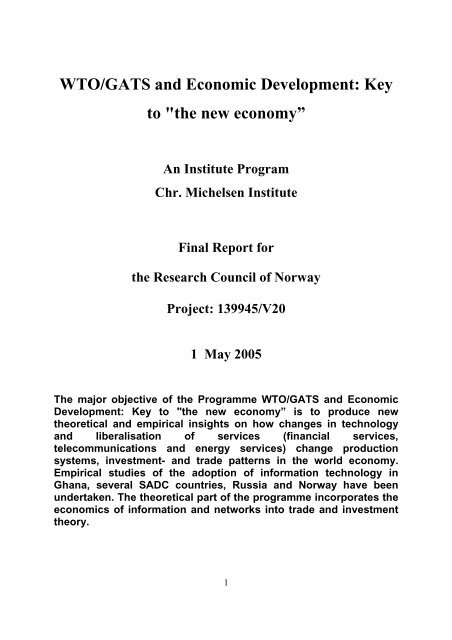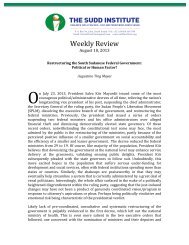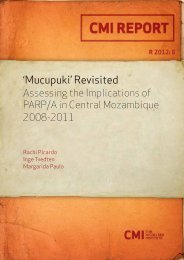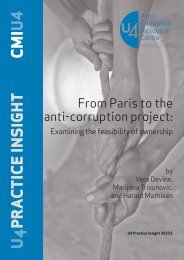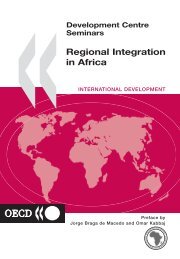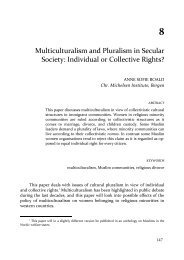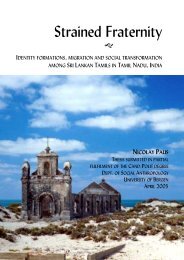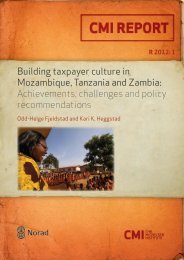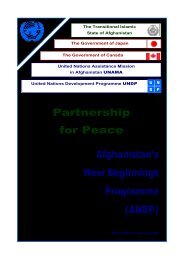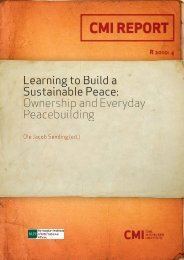WTO/GATS and Economic Development: Key to "the new ... - CMI
WTO/GATS and Economic Development: Key to "the new ... - CMI
WTO/GATS and Economic Development: Key to "the new ... - CMI
Create successful ePaper yourself
Turn your PDF publications into a flip-book with our unique Google optimized e-Paper software.
<strong>WTO</strong>/<strong>GATS</strong> <strong>and</strong> <strong>Economic</strong> <strong>Development</strong>: <strong>Key</strong><br />
<strong>to</strong> "<strong>the</strong> <strong>new</strong> economy”<br />
An Institute Program<br />
Chr. Michelsen Institute<br />
Final Report for<br />
<strong>the</strong> Research Council of Norway<br />
Project: 139945/V20<br />
1 May 2005<br />
The major objective of <strong>the</strong> Programme <strong>WTO</strong>/<strong>GATS</strong> <strong>and</strong> <strong>Economic</strong><br />
<strong>Development</strong>: <strong>Key</strong> <strong>to</strong> "<strong>the</strong> <strong>new</strong> economy” is <strong>to</strong> produce <strong>new</strong><br />
<strong>the</strong>oretical <strong>and</strong> empirical insights on how changes in technology<br />
<strong>and</strong> liberalisation of services (financial services,<br />
telecommunications <strong>and</strong> energy services) change production<br />
systems, investment- <strong>and</strong> trade patterns in <strong>the</strong> world economy.<br />
Empirical studies of <strong>the</strong> adoption of information technology in<br />
Ghana, several SADC countries, Russia <strong>and</strong> Norway have been<br />
undertaken. The <strong>the</strong>oretical part of <strong>the</strong> programme incorporates <strong>the</strong><br />
economics of information <strong>and</strong> networks in<strong>to</strong> trade <strong>and</strong> investment<br />
<strong>the</strong>ory.<br />
1
1 Introduction<br />
The programme <strong>WTO</strong>/<strong>GATS</strong> <strong>and</strong> <strong>Economic</strong> <strong>Development</strong> represents <strong>the</strong> core project in a<br />
Strategic Institute Programme at <strong>CMI</strong> on Producer Services. 1 Services are in many ways <strong>the</strong><br />
glue that holds an economy <strong>to</strong>ge<strong>the</strong>r. Production of goods for <strong>the</strong> market would not be<br />
possible without transport, s<strong>to</strong>rage <strong>and</strong> marketing services. Investment <strong>and</strong> international trade<br />
would be ineffective without financial services, <strong>and</strong> social <strong>and</strong> technological conditions would<br />
have been static without education <strong>and</strong> research. Finally, ideas <strong>and</strong> technology would not<br />
spread without information services.<br />
The <strong>WTO</strong>/<strong>GATS</strong> programme covers three main issues:<br />
A. <strong>the</strong> adoption of information technology <strong>and</strong> its impact on supply chain management.<br />
B. <strong>the</strong> impact of trade liberalisation (financial services, telecommunications <strong>and</strong> energy<br />
services in particular) on economic growth <strong>and</strong> global investment patterns.<br />
C. <strong>the</strong> impact of trade liberalisation on <strong>the</strong> use of producer services <strong>and</strong> on vertical<br />
specialisation.<br />
The report is organised as follows: Section 2 summarises <strong>the</strong> programme activities <strong>and</strong><br />
experiences with <strong>the</strong> Research Council of Norway (NFR). In section 3, findings from <strong>the</strong><br />
main research projects of <strong>the</strong> core research team are summarised (‘populærvitenskapelig<br />
framstilling’). Section 4 provides a list of publications from <strong>the</strong> programme. O<strong>the</strong>r forms of<br />
research dissemination <strong>and</strong> networking are presented in section 5. In section 6, names of<br />
affiliated researchers are listed.<br />
2. Progress, projects <strong>and</strong> research outputs<br />
(Oppnådde faglige resultater)<br />
Since 2001, <strong>the</strong> <strong>WTO</strong>/<strong>GATS</strong> programme has generated a number of projects <strong>and</strong> attracted<br />
several researchers from outside <strong>the</strong> ‘core’ group. New projects have been generated with<br />
funding from <strong>the</strong> World Bank during 2003.<br />
Publishing has been a focus within <strong>the</strong> individual projects. Participation in seminars <strong>and</strong><br />
conferences has been considered an important <strong>to</strong>ol <strong>to</strong> streng<strong>the</strong>n existing <strong>and</strong> build <strong>new</strong><br />
professional networks. One PhD-student has been affiliated with <strong>the</strong> programme during most<br />
of <strong>the</strong> period, while ano<strong>the</strong>r PhD c<strong>and</strong>idate has been affiliated with <strong>the</strong> program for shorter<br />
periods.<br />
The contact <strong>and</strong> routines for reporting <strong>to</strong> <strong>the</strong> Research Council of Norway (NFR) have<br />
worked well. NFR has not intervened in <strong>the</strong> implementation of <strong>the</strong> research, nor in changes in<br />
<strong>the</strong> use of manpower due <strong>to</strong> changes of <strong>the</strong> staff situation at <strong>CMI</strong>. Dr. Arne Wiig <strong>to</strong>ok over as<br />
project leader in December 2002, when Dr. Hildegunn Nordås left for a position at <strong>the</strong><br />
Research Department of <strong>the</strong> World Trade Organisation in Geneva, working mainly on <strong>GATS</strong><br />
related issues.<br />
Annual reports have been submitted <strong>to</strong> <strong>the</strong> Research Council. Publishing, networking <strong>and</strong><br />
generating <strong>new</strong> projects have been integrated parts of <strong>the</strong> design of <strong>the</strong> programme, as have<br />
<strong>the</strong> organisation of <strong>and</strong> participation in workshops, seminars, conferences, etc.<br />
1 A final report of this broader programme has already been accepted by NFR.The final report can be derived<br />
from http://www.cmi.no/research/w<strong>to</strong>gats/SIP-ProducerServices.pdf 2
3. Findings<br />
(Populærvitenskapelig framstilling av de viktigste FoU-resultatene)<br />
The purpose of this section is <strong>to</strong> give an overview of <strong>the</strong> main findings of <strong>the</strong> main research<br />
projects. A summary of our general findings is provided on each of <strong>the</strong> three main issues<br />
covered by <strong>the</strong> programme. Thereafter we provide a summary of <strong>the</strong> main findings from each<br />
project with an emphasis on work done by <strong>CMI</strong> researchers. More detailed presentations of<br />
findings are made in <strong>the</strong> various publications written by <strong>the</strong> involved researchers since <strong>the</strong><br />
inauguration of <strong>the</strong> programme. Downloading of our most recent publications can be done<br />
from our web page(www.cmi.no/areapubs.cfmresarea=1).<br />
3.1 Summary of <strong>the</strong> results of <strong>the</strong> three main issues covered by <strong>the</strong> Institute Programme:<br />
A. <strong>the</strong> adoption of information technology <strong>and</strong> its impact on supply chain management.<br />
<strong>Development</strong> of telecommunication services has facilitated cross-border trade over<br />
<strong>the</strong> internet. There are online possibilities even in <strong>the</strong> remotest part of <strong>the</strong> world.<br />
Through cross country analysis as well as case studies, particularly in Namibia <strong>and</strong><br />
Ghana, we show that developing countries often lack complementary fac<strong>to</strong>rs such as<br />
competence, infrastructure <strong>and</strong> well-functioning institutions <strong>to</strong> be able <strong>to</strong> make <strong>the</strong><br />
most of <strong>the</strong> technological opportunities. At <strong>the</strong> same time, <strong>the</strong>re are huge savings in<br />
transaction costs (such as transportation, time <strong>and</strong> costs of using intermediaries) by<br />
using <strong>new</strong> technology such as internet or mobile phones.<br />
B. <strong>the</strong> impact of trade liberalisation (financial services, telecommunications <strong>and</strong> energy<br />
services in particular) on economic growth <strong>and</strong> global investment patterns. Our<br />
studies of services <strong>and</strong> growth confirm <strong>the</strong> importance of finance <strong>and</strong><br />
telecommunications for economic growth, <strong>and</strong> suggest that <strong>the</strong>ir impact is greater in<br />
developing countries. Moreover, <strong>the</strong> foreign component in <strong>the</strong>se types of sec<strong>to</strong>rs, in<br />
terms of foreign direct investment (FDI), might have a positive effect on growth<br />
potential. Generating foreign investment in key service industries, is <strong>the</strong>refore an<br />
important task for growth-oriented governments. Our results suggest that market size,<br />
a solid manufacturing base, <strong>and</strong> institutional quality, are important attrac<strong>to</strong>rs of FDI<br />
in key service industries.<br />
C. <strong>the</strong> impact of trade liberalisation on <strong>the</strong> use of producer services <strong>and</strong> on vertical<br />
specialisation. <strong>Development</strong>s in communication, transport, logistics <strong>and</strong> supply chain<br />
management technologies have reduced trade costs substantially over recent years<br />
<strong>and</strong> trade volumes relative <strong>to</strong> output have increased accordingly. However, an<br />
individual country’s ability <strong>to</strong> integrate in<strong>to</strong> international production networks<br />
depends on its relative trade costs. Our studies find that high <strong>to</strong> moderate tariffs, poor<br />
port facilities, corruption <strong>and</strong> poor telecommunication infrastructure are substantial<br />
obstacles <strong>to</strong> <strong>the</strong> participation in production networks. Fur<strong>the</strong>r, it is found that small<br />
<strong>and</strong>/or poor countries can gain substantially from participating in such networks. The<br />
gains are in <strong>the</strong> form of access <strong>to</strong> a broader variety of intermediate <strong>and</strong> final goods<br />
<strong>and</strong> services, higher productivity <strong>and</strong> in <strong>the</strong> case of trade in skills-intensive<br />
intermediate services, a more equal distribution both within poor countries <strong>and</strong><br />
between rich <strong>and</strong> poor countries. Finally it is suggested that trade liberalization in<br />
key infrastructure services improve <strong>the</strong> quality <strong>and</strong> lowers <strong>the</strong> cost of such services.<br />
3
3.2 Summary of individual project results issue A: The adoption of ICT <strong>and</strong><br />
its impact on supply chain management<br />
A1 Trust, trade networks <strong>and</strong> telecommunication development (Overaa)<br />
This project studies how traders in Ghana make use of better access <strong>to</strong> telephones, which<br />
came about as a result of liberalization of <strong>the</strong> telecom sec<strong>to</strong>r in 1995. By 2003 Ghana’s teledensity<br />
had increased from 0.3 <strong>to</strong> 1.3 mainlines per 100 persons <strong>and</strong> four mobile phone<br />
companies had 600,000 subscribers. Prepaid GSM services are slowly becoming more<br />
affordable <strong>and</strong> thous<strong>and</strong>s of small communication centers <strong>and</strong> public phone boots have been<br />
established. Never<strong>the</strong>less, access <strong>to</strong> telecom services is still markedly biased in favor of urban<br />
areas <strong>and</strong> higher income groups.<br />
Based on qualitative fieldwork in Accra in 2001 <strong>and</strong> 2003 – a time span over which<br />
considerable change could be observed – <strong>the</strong> impact of access <strong>to</strong> <strong>new</strong> communication <strong>to</strong>ols on<br />
<strong>the</strong> business practices of traders in cloth, fish <strong>and</strong> agricultural produce was investigated.<br />
Focus was on <strong>the</strong> extent <strong>to</strong> which <strong>the</strong> use of telecommunication technology reduces traders’<br />
time <strong>and</strong> transportation costs, <strong>and</strong> its impact on <strong>the</strong> way in which relationships of trust in trade<br />
networks are initiated <strong>and</strong> maintained. Approximately 10 key informants (managers of<br />
telecom companies, mobile phone dealers, truck drivers, etc.) <strong>and</strong> 100 small- <strong>and</strong> large scale<br />
traders (with <strong>and</strong> without phones) were interviewed. The data are presented as case studies of<br />
individual traders <strong>and</strong> trade networks. The points below summarize <strong>the</strong> main findings:<br />
• Substitution of travel with calls in order <strong>to</strong> exchange information (i.e. on prices,<br />
supply <strong>and</strong> dem<strong>and</strong>) considerably reduces traders’ time <strong>and</strong> transportation costs.<br />
• Particularly benefiting are traders, who a) co-ordinate large networks, b) operate over<br />
long distances <strong>and</strong> c) trade in commodities where detailed information on quality <strong>and</strong><br />
design is required.<br />
• Mobile phones enable traders <strong>to</strong> provide <strong>the</strong>ir cus<strong>to</strong>mers with better services (i.e.<br />
information on quality, quantities, prices, supplies, timing <strong>and</strong> availability around <strong>the</strong><br />
clock). These major competitive advantages are only effective in relation <strong>to</strong> trade<br />
partners <strong>and</strong> cus<strong>to</strong>mers who also have phones<br />
• Limited mobile phone coverage <strong>and</strong> fixed line network in rural areas severely limits<br />
<strong>the</strong> returns for traders in agricultural produce of investing in mobile phones. Traders in<br />
cloth, whose cus<strong>to</strong>mers are often urban <strong>and</strong> middle/high income earners, are <strong>the</strong>refore<br />
more likely <strong>to</strong> actively use phones than traders in agricultural produce.<br />
• Traveling traders, who frequently experience crime <strong>and</strong> accidents while on <strong>the</strong> road,<br />
find that mobile phones are good security investments – reducing transaction costs in a<br />
risky economic environment.<br />
• Risks of <strong>the</strong>ft, payment default <strong>and</strong> embezzlement can be reduced when large money<br />
transactions, hi<strong>the</strong>r<strong>to</strong> h<strong>and</strong>ed over in large piles of cash, are replaced with bank<br />
transfers moni<strong>to</strong>red through phone calls. This <strong>new</strong> mode of transacting – clearly<br />
enhancing trust between exchange partners – is generally still not common, but was<br />
found <strong>to</strong> be institutionalized between wholesalers <strong>and</strong> importers of frozen fish.<br />
• Moni<strong>to</strong>ring intermediaries’ movements <strong>and</strong> transactions can be improved through<br />
frequent long-distance mobile phone calls. But for initial contact <strong>and</strong> elaborate<br />
contract negotiations, face-<strong>to</strong>-face communication <strong>and</strong> observation of behavior is<br />
required before trust can be established.<br />
4
In conclusion, <strong>the</strong> effects of traders’ access <strong>to</strong> telecommunication technology in terms of<br />
improving efficiency <strong>and</strong> reducing costs <strong>and</strong> risks are overwhelmingly positive. The<br />
opportunity for long-distance communication also enhance trust between trade partners.<br />
However, talking on <strong>the</strong> phone is not in itself a trust-building mechanism. Ra<strong>the</strong>r it is a <strong>to</strong>ol <strong>to</strong><br />
improve already existing trust-building mechanisms – exchange of information, observation<br />
of behavior <strong>and</strong> sanctions against dishonest action –, enabling traders <strong>to</strong> engage in<br />
transactions that may o<strong>the</strong>rwise have been <strong>to</strong>o hazardous in this type of economic<br />
environment.<br />
With regards <strong>to</strong> methodological limitations, this study is based upon a small sample <strong>and</strong> is<br />
limited <strong>to</strong> traders. On <strong>the</strong> o<strong>the</strong>r h<strong>and</strong>, it is one among few studies that gives in-depth insight<br />
in<strong>to</strong> <strong>the</strong> societal effect of <strong>the</strong> telecommunications revolution that is currently going on in<br />
Africa. The message <strong>to</strong> policy makers is that investments directed <strong>to</strong>wards making<br />
telecommunications universally accessible <strong>and</strong> affordable is of crucial importance for<br />
economic development.<br />
Main publications:<br />
Overå, Ragnhild (2004) Networks, distance <strong>and</strong> trust: telecommunications <strong>and</strong> changing<br />
trading practices in Ghana. Bergen: Chr. Michelsen Institute (<strong>CMI</strong> Working Paper WP<br />
15:2004). The article has also been submitted <strong>to</strong> World <strong>Development</strong>.<br />
A2 Tourism, <strong>the</strong> internet <strong>and</strong> intermediaries<br />
UNCTAD claims that <strong>the</strong> development of <strong>to</strong>urism may be one of <strong>the</strong> most valuable avenues<br />
for reducing <strong>the</strong> marginalisation of least developed countries (LDCs) in <strong>the</strong> global economy<br />
<strong>and</strong> that <strong>the</strong> use of internet technology <strong>and</strong> e-commerce represent opportunities for developing<br />
countries <strong>to</strong> improve <strong>the</strong>ir economic position relative <strong>to</strong> <strong>the</strong> developed world.<br />
One project analyses <strong>to</strong> what extent <strong>the</strong> use of information <strong>and</strong> communication technology<br />
(ICT) in <strong>the</strong> <strong>to</strong>urist industry facilitates growth in <strong>to</strong>urism services in developing countries.<br />
The project also seeks <strong>to</strong> outline <strong>the</strong> conditions under which <strong>the</strong> local industry might bypass<br />
intermediaries such as overseas travel agents <strong>and</strong> <strong>to</strong>ur opera<strong>to</strong>rs, <strong>the</strong>reby reducing transaction<br />
costs (commissions for instance). A particular emphasis is put on two important roles played<br />
by <strong>the</strong> intermediaries. They possess wide-ranging information that opera<strong>to</strong>rs may lack <strong>and</strong><br />
may <strong>the</strong>refore offer <strong>the</strong> consumer a bundle (package) of different goods. Secondly, <strong>the</strong>y act as<br />
certifiers (guaran<strong>to</strong>rs) of <strong>the</strong> quality of goods <strong>and</strong> services.<br />
Studies of <strong>the</strong> Namibian <strong>to</strong>urist industry confirm that technology alone will not make much of<br />
a difference. Overseas travel agents <strong>and</strong> <strong>to</strong>ur opera<strong>to</strong>rs at home play an important role in<br />
supplying information <strong>and</strong> ensuring <strong>the</strong> quality of a trip <strong>to</strong> an exotic destination. Unless<br />
Namibian opera<strong>to</strong>rs can fulfil <strong>the</strong>se two functions <strong>and</strong> ensure quality <strong>and</strong> trust, <strong>the</strong>y will<br />
continue <strong>to</strong> depend on intermediaries <strong>to</strong> attract <strong>to</strong>urists.<br />
5
Service providers in Namibia <strong>and</strong> representatives from <strong>the</strong> government <strong>and</strong> business<br />
associations were interviewed about <strong>the</strong>ir use of intermediaries <strong>and</strong> how <strong>the</strong> Internet has<br />
restructured supply chain management. The points below summarize some of <strong>the</strong> more<br />
specific result of <strong>the</strong> study:<br />
• There is an extensive use of middlemen. 60-80 % of bookings go through<br />
intermediaries.<br />
• Distribution costs are high. Commission is in <strong>the</strong> range between 9-35 % of market<br />
price. Making intermediaries redundant may <strong>the</strong>refore increase <strong>the</strong> revenue retention<br />
rate in Namibia.<br />
• Few service providers are connected <strong>to</strong> Global Distribution Systems partly due <strong>to</strong> a<br />
thin market <strong>and</strong> high entry costs. Online booking is not common.<br />
• Service providers need <strong>to</strong> connect <strong>to</strong> a network in order <strong>to</strong> reach a larger market <strong>and</strong><br />
exploit network externalities. The establishment of a destination marketing<br />
organisation is a starting point, although <strong>the</strong> co-operative efforts so far have not<br />
succeeded partly because such an organisation represents a public good.<br />
A second project focuses on <strong>the</strong> role intermediaries play as certifiers <strong>and</strong> how complementary<br />
fac<strong>to</strong>rs such as human capital <strong>and</strong> technology influence <strong>the</strong> degree of direct marketing on <strong>the</strong><br />
Internet. Certification is expected <strong>to</strong> be particular relevant for product or services produced in<br />
countries with high risk or low quality reputation. The certification role of intermediaries are<br />
explored in more detail through an analysis of marketing on WEB across <strong>to</strong>urist destinations<br />
with different level of risk. Wiig makes a cross country analysis of 122 countries that<br />
confirms that direct marketing on <strong>the</strong> Internet is significant as a marketing <strong>to</strong>ol only in<br />
contexts of political stability <strong>and</strong> mutual trust. Wiig find some evidence that:<br />
• Although <strong>new</strong> information technology may facilitate direct marketing <strong>and</strong> a higher<br />
retention of revenue (by eliminating <strong>the</strong> intermediaries), <strong>the</strong> results of this study<br />
indicate that this process will mainly take place in low-risk countries.<br />
• Income level <strong>and</strong> market size are also significant explana<strong>to</strong>ry variables, while human<br />
capital <strong>and</strong> <strong>the</strong> structure of <strong>the</strong> financial sec<strong>to</strong>r play an insignificant role on <strong>the</strong> extent<br />
of direct marketing..<br />
From a policy prospective, an appropriate design of an ICT policy requires an identification<br />
of complementary assets needed <strong>to</strong> adopt <strong>to</strong> <strong>the</strong> <strong>new</strong> technology. Changes in ICT, <strong>the</strong>refore,<br />
do not necessarily lead <strong>to</strong> changes in trade patterns without changing <strong>the</strong> ‘social capital’<br />
among <strong>the</strong> trading partners. The data <strong>and</strong> <strong>the</strong> methodology applied have some limitations as<br />
<strong>the</strong>y are based on Google search, but represent one of <strong>the</strong> few attempts in <strong>the</strong> literature <strong>to</strong> test<br />
empirically <strong>the</strong> relationship between risk <strong>and</strong> disintermediation.<br />
Main publications:<br />
Wiig A. 2003 Developing countries <strong>and</strong> <strong>the</strong> <strong>to</strong>urist industry: The case of Namibia.Forum for<br />
<strong>Development</strong> Studies (1) 59-88.<br />
Wiig A. 2004. Risk <strong>and</strong> disintermediation in <strong>to</strong>urism. Bergen:Chr. Michelsen Institute (<strong>CMI</strong><br />
Working Paper WP 2004: 6) 19 p. An extensively revised version of this paper is:<br />
Wiig A. 2005. The Internet, risk <strong>and</strong> <strong>the</strong> role of intermediaries. Mimeo Bergen:Chr.<br />
Michelsen Institute (submitted <strong>to</strong> <strong>the</strong> Journal of <strong>Development</strong> Studies).<br />
6
A3 Trust <strong>and</strong> trade (S<strong>and</strong>elien)<br />
This project explores <strong>the</strong> facts behind <strong>the</strong> buzzwords 'globalisation' <strong>and</strong> '<strong>the</strong> <strong>new</strong> economy'. In<br />
general we associate <strong>the</strong>se concepts with a borderless world where economic transactions are<br />
managed through rapid electronic communication. This project questions this notion <strong>and</strong><br />
presents an overview of investigations that have been conducted on trade flows.<br />
Trade is drastically reduced by distance <strong>and</strong> borders, contradicting <strong>the</strong> notion of a borderless<br />
world. This phenomenon cannot be explained only by transportation costs. Ano<strong>the</strong>r barrier <strong>to</strong><br />
trade has <strong>to</strong> exist. The project outlines different possible explanations of this phenomenon, but<br />
focuses strongly on <strong>the</strong> significance of trust in transactions. It concludes that <strong>the</strong>re is a range<br />
of explanations working <strong>to</strong>ge<strong>the</strong>r <strong>to</strong> explain why <strong>the</strong>re is less trade over longer distances.<br />
However, <strong>the</strong> reduced possibility of finding trusting relations at distant locations is presented<br />
as a strong argument <strong>and</strong> a possible solution <strong>to</strong> <strong>the</strong> ‘mystery of <strong>the</strong> missing trade’.<br />
Main publications:<br />
S<strong>and</strong>elien G. 2003. Trust <strong>and</strong> trade: Is distance dead <strong>CMI</strong> Report 4:2003.<br />
3.3 Summary of individual project results issue B: Trade liberalisation of<br />
services, economic growth <strong>and</strong> investments patterns<br />
B1. Determinants of service sec<strong>to</strong>r FDI (Kolstad <strong>and</strong> Villanger)<br />
Foreign direct investment (FDI) in <strong>the</strong> service industries has increased substantially in recent<br />
decades. For developing countries, service-industry FDI can intensify domestic competition,<br />
or provide access <strong>to</strong> services that domestic producers do not supply. The important research<br />
question addressed in this project is how developing countries can attract more foreign<br />
investment in service sec<strong>to</strong>rs This project uses industry-level data on FDI inflows <strong>to</strong><br />
developing countries in order <strong>to</strong> determine <strong>the</strong> main host country determinants of FDI in <strong>the</strong><br />
major service industries.<br />
This study examines <strong>the</strong> host country determinants of foreign direct investment (FDI) flows in<br />
services as a whole <strong>and</strong> in <strong>the</strong> major service industries. It is found that FDI in <strong>the</strong> service<br />
industries is attracted <strong>to</strong> large domestic markets, but unaffected by trade openness. A strong<br />
correlation between FDI in manufacturing <strong>and</strong> FDI in certain producer services (finance <strong>and</strong><br />
transport) is found. This lends support <strong>to</strong> <strong>the</strong> idea that producer services are important in<br />
binding <strong>to</strong>ge<strong>the</strong>r vertically disintegrated chains of production. While political risk does not<br />
affect FDI in services overall, socio-political indices are related <strong>to</strong> FDI in certain service<br />
industries. In particular, investment in <strong>the</strong> transport sec<strong>to</strong>r (which in this study includes<br />
telecommunications) is sensitive <strong>to</strong> <strong>the</strong> level of institutional quality in host countries.<br />
The study is based on panel data of foreign direct investment <strong>and</strong> a number of potential<br />
determinants, for 57 countries over <strong>the</strong> period 1989-2000. The econometric approach taken,<br />
allows for heterogeneity across countries, <strong>and</strong> thorough tests of robustness <strong>to</strong> changes in data<br />
sample <strong>and</strong> specifications are performed. As is usually <strong>the</strong> case, a study of this kind identifies<br />
average effects of economic <strong>and</strong> institutional variables across countries, <strong>and</strong> fur<strong>the</strong>r work is<br />
needed <strong>to</strong> assess <strong>the</strong> applicability <strong>to</strong> individual regions or countries. Given <strong>the</strong> limited amount<br />
of previous published work on services FDI, <strong>the</strong>re might also be important variables that have<br />
been left out, leading <strong>to</strong> potential omitted variable bias. On <strong>the</strong> o<strong>the</strong>r h<strong>and</strong>, <strong>the</strong> paucity of<br />
7
similar studies makes this groundbreaking work.<br />
Main publications:<br />
Kolstad I. <strong>and</strong> Espen Villanger, 2004. Determinants of foreign direct investments in services.<br />
Bergen:Chr. Michelsen Institute (<strong>CMI</strong> Working Paper WP 2004: 2) 25 p. (<strong>to</strong> be submitted <strong>to</strong><br />
<strong>the</strong> Journal of International Business Studies<br />
B2 Foreign Direct Investment Patterns <strong>and</strong> <strong>the</strong> Role of Socioeconomic<br />
<strong>Development</strong> <strong>and</strong> His<strong>to</strong>ry. Informal Network Formation in Imperfect Markets<br />
(PhD Tøndel)<br />
There is an ongoing debate as <strong>to</strong> <strong>the</strong> benefits <strong>and</strong> potential disadvantages of globalization in<br />
<strong>the</strong> shape of international trade. Specifically, it has been stipulated that competition among<br />
developing countries <strong>to</strong> attract foreign direct investments is detrimental <strong>to</strong> <strong>the</strong> socio-economic<br />
development of <strong>the</strong>se countries. The international inves<strong>to</strong>r is accused of investing in countries<br />
that are undemocratic <strong>and</strong> that show little respect for <strong>the</strong>ir citizens <strong>and</strong> human rights.<br />
However, studies have suggested, <strong>and</strong> our preliminary results based on panel data from 75<br />
countries for <strong>the</strong> period 1989-2000, indicate that this is not necessarily <strong>the</strong> case.<br />
We found a positive relationship between democratization <strong>and</strong> <strong>the</strong> inflow of foreign direct<br />
investment. Our results indicate that improvements in political rights <strong>and</strong> civil liberties tend <strong>to</strong><br />
increase FDI. As a follow up, this project will examine <strong>the</strong> causality of <strong>the</strong> relationship <strong>and</strong><br />
explore potential differences <strong>and</strong> similarities between different groups of countries. That is<br />
between resource rich countries <strong>and</strong> o<strong>the</strong>rs, <strong>and</strong> between countries belonging <strong>to</strong> different<br />
income categories.<br />
Also, globalization <strong>and</strong> technological development diminish <strong>the</strong> importance of physical<br />
distance. However, his<strong>to</strong>rical <strong>and</strong> cultural distance may prove a more difficult obstacle <strong>to</strong><br />
overcome. An aim of this project is <strong>the</strong>refore <strong>to</strong> look closer at <strong>the</strong> importance of such bonds<br />
in determining <strong>the</strong> pattern of foreign direct investments relative <strong>to</strong> o<strong>the</strong>r fac<strong>to</strong>rs. Transnational<br />
networks have traditionally been considered means of overcoming international trade barriers,<br />
whereas domestic networks have been perceived <strong>to</strong> be trade barriers. A fur<strong>the</strong>r aim of this<br />
project is analysing <strong>the</strong> value of belonging <strong>to</strong> informal networks under varying degrees of<br />
insecurity, <strong>and</strong> <strong>the</strong> costs firms are willing <strong>to</strong> incur <strong>to</strong> participate in <strong>the</strong>se networks.<br />
This is a PhD-project at <strong>the</strong> Norwegian School of <strong>Economic</strong>s <strong>and</strong> Business Administration<br />
(NHH) undertaken by Line Tøndel Seim. The project started early 2001, with <strong>the</strong> compulsory<br />
Ph.D programme courses, due <strong>to</strong> maternity leaves this project is postponed <strong>and</strong> will be<br />
completed in 2007.<br />
Main Publications:<br />
Kolstad, Ivar <strong>and</strong> Line Tøndel. 2002. Social development <strong>and</strong> foreign direct investments in<br />
developing countries. Bergen:Chr. Michelsen Institute (<strong>CMI</strong> Report R 2002:11)<br />
8
B3 The importance of <strong>the</strong> financial sec<strong>to</strong>r <strong>and</strong> telecommunication for<br />
economic growth (Jacobsen <strong>and</strong> Andersen)<br />
One project explores <strong>the</strong> relationship between telecommunications development <strong>and</strong><br />
economic growth while ano<strong>the</strong>r project explores <strong>the</strong> relationship between financial sec<strong>to</strong>r<br />
development <strong>and</strong> economic growth. Both projects perform econometric analyses.<br />
An econometric study analysing <strong>the</strong> relationship between telecommunication development<br />
<strong>and</strong> economic growth show that <strong>the</strong>re seems <strong>to</strong> be larger growth effects from<br />
telecommunication development in developing countries than in developed countries, a result<br />
that contradicts earlier findings. The result stems from a larger indirect impact of<br />
telecommunications in o<strong>the</strong>r sec<strong>to</strong>rs.<br />
A second study analyses <strong>the</strong> role <strong>the</strong> financial sec<strong>to</strong>r plays in economic growth. It can reduce<br />
<strong>the</strong> cost of acquiring information, conducting transactions <strong>and</strong> facilitating saving mobilisation.<br />
An econometric study shows that <strong>the</strong>re is a positive statistical relationship between financial<br />
development <strong>and</strong> economic growth. It is also found that financial sec<strong>to</strong>r developments seem<br />
<strong>to</strong> have at least <strong>the</strong> same importance on economic growth in developing countries as in<br />
industrialised countries.<br />
Main publications:<br />
Andersen, Susanne 2003. The influence <strong>and</strong> effects of financial development on economic<br />
growth. An empirical approach. Bergen: Chr. Michelsen Institute (<strong>CMI</strong> Report R<br />
2003:14).<br />
Jacobsen, Karen Frederikke Lomel<strong>and</strong> 2003. Telecommunications – a means <strong>to</strong> economic<br />
growth in developing countries Bergen: Chr. Michelsen Institute (<strong>CMI</strong> Report R<br />
2003:13).<br />
3.4 Summary of individual project results issue C: <strong>the</strong> impact of trade<br />
liberalisation on <strong>the</strong> use of producer services <strong>and</strong> on vertical specialisation<br />
C1 Producer services <strong>and</strong> vertical specialization (Nordaas)<br />
Vertical specialisation (VS) <strong>and</strong> outsourcing have gained prominence in international trade<br />
recently <strong>and</strong> are viewed as channels for technology transfer, market access <strong>and</strong> integration<br />
in<strong>to</strong> <strong>the</strong> world economy for developing countries. However, due <strong>to</strong> just-in-time management<br />
systems <strong>and</strong> <strong>the</strong> expectation of quality control at source, delays on delivery <strong>and</strong> faulty<br />
components are not <strong>to</strong>lerated. Our study analyses empirically <strong>the</strong> importance of infrastructure<br />
<strong>and</strong> quality of institutions for <strong>the</strong> extent <strong>to</strong> which industries in a country participates in<br />
international vertical supply chains. It is found that tariff protection has a strong anti-VS bias<br />
<strong>and</strong> that market size, <strong>the</strong> effectiveness of ports, time for cus<strong>to</strong>ms clearance, telephone density<br />
<strong>and</strong> control of corruption are <strong>the</strong> most important determinants of VS. The larger <strong>the</strong> market,<br />
<strong>the</strong> lower is <strong>the</strong> import content in a country’s exports, simply because more parts <strong>and</strong><br />
components are produced locally in a large economy. By <strong>the</strong> same <strong>to</strong>ken, in small <strong>and</strong> poor<br />
countries, being able <strong>to</strong> import parts <strong>and</strong> components for export processing in a cost-effective<br />
way is crucial for entering in<strong>to</strong> international supply chains. Policy implications are that<br />
liberalization of key logistics services <strong>and</strong> relaxation of rules of origin for preferential access<br />
<strong>to</strong> developed markets are important for poor countries’ integration in<strong>to</strong> vertical supply chains.<br />
9
A second study combines a case study <strong>and</strong> <strong>the</strong>ory development. The case study is of a small<br />
multinational naval designer firm located in rural Western Norway (Fitjar). The firm trades its<br />
designer <strong>and</strong> engineering services through a combination of face-<strong>to</strong>-face interaction with<br />
cus<strong>to</strong>mers <strong>and</strong> electronic transmission of drawings <strong>and</strong> documentation. Inspired by <strong>the</strong> case<br />
study, a model of spatial division of labour between fabrication <strong>and</strong> design is developed. It<br />
predicts that <strong>the</strong> reach of designer service firms depends on <strong>the</strong> wage rate for professional<br />
workers, <strong>the</strong> cost of fabrication <strong>and</strong> investment in ICT. It is argued that <strong>the</strong> model is useful for<br />
analysing restructuring following de-industrialisation in rich countries. The interesting <strong>and</strong><br />
hotly debated question is whe<strong>the</strong>r de-industrialised regions will thrive on trade in industrial<br />
design <strong>and</strong> engineering in <strong>the</strong> information economy, or stagnate <strong>and</strong> decline. The case study<br />
<strong>and</strong> <strong>the</strong> model indicate that industrial design <strong>and</strong> engineering are more likely <strong>to</strong> be retained in<br />
<strong>the</strong> region when <strong>the</strong> physical or cultural distance <strong>to</strong> <strong>the</strong> <strong>new</strong> location of fabrication is<br />
moderate <strong>and</strong> <strong>the</strong> fabrication costs in <strong>the</strong> emerging market are significantly lower than in <strong>the</strong><br />
rich country. These two conditions are usually not satisfied at <strong>the</strong> same time, since<br />
neighbouring countries tend <strong>to</strong> have similar income <strong>and</strong> cost levels. Never<strong>the</strong>less, relocation<br />
from Western <strong>to</strong> Eastern Europe could probably satisfy <strong>the</strong>se conditions; so would relocation<br />
from Western Europe <strong>to</strong> China, but probably not from Western Europe <strong>to</strong> South Korea.<br />
Retaining designer <strong>and</strong> engineering services would also be more likely if <strong>the</strong> opportunity cost<br />
of entrepreneurship is not <strong>to</strong>o high in <strong>the</strong> rich-country region, <strong>and</strong> if <strong>the</strong> region has good<br />
access <strong>to</strong> low-cost <strong>and</strong> effective telecommunications. In particular, ICT investments allow for<br />
spatial separation of CAD services <strong>and</strong> CAM fabrication over large distances, but<br />
complementary direct communication is necessary <strong>and</strong> this limits <strong>the</strong> reach of designer <strong>and</strong><br />
engineering services. Thus, <strong>the</strong>re probably exists a distance beyond which outsourcing will<br />
not take place <strong>and</strong> a wage rate above which entrepreneurs will prefer <strong>to</strong> join <strong>the</strong> labour force.<br />
A third study focuses on internationalization of services such as education <strong>and</strong> health. These<br />
are complex services with extensive specialization <strong>and</strong> where information content is high <strong>and</strong><br />
much of <strong>the</strong> information can be digitized <strong>and</strong> transmitted over electronic networks. In this<br />
respect <strong>the</strong> services are similar <strong>to</strong> audiovisual services. This paper discusses how ICTenabled<br />
trade affects <strong>the</strong> diversity of content of such services in small economies with shallow<br />
domestic markets. It is assumed that <strong>the</strong> services need <strong>to</strong> be provided locally, but some of <strong>the</strong><br />
content can be sourced from abroad. The study analyzes trade in such services between a<br />
small/poor <strong>and</strong> a large/rich country. Trade broadens <strong>the</strong> variety of content in <strong>the</strong> small<br />
country, but exporters of services need <strong>to</strong> incur significant costs in order <strong>to</strong> set up <strong>the</strong><br />
technology <strong>and</strong> enter foreign markets. As a result <strong>the</strong> average size of producers of content<br />
increases <strong>and</strong> <strong>the</strong> diversity may decline in large countries. Trade fur<strong>the</strong>r leads <strong>to</strong> a more equal<br />
distribution of income both between <strong>the</strong> small <strong>and</strong> <strong>the</strong> large country <strong>and</strong> within <strong>the</strong> small<br />
country.<br />
Main publications:<br />
Nordås, Hildegunn Kyvik. 2004, "Location of Engineering <strong>and</strong> Designer Services in <strong>the</strong><br />
Space Economy", in Henri L.F. de Groot, Peter Nijkamp <strong>and</strong> Roger S<strong>to</strong>ugh (eds), Rising<br />
Entrepreneurship in a Shrinking World A Spatial Perspective, Edward Elgar.<br />
Nordås, Hildegunn Kyvik. 2003, "Vertical specialization <strong>and</strong> <strong>the</strong> quality of infrastructure",<br />
World Trade Organization ERSD Working Paper no 2003-04.<br />
Nordås, Hildegunn Kyvik. 2003 "ICT, access <strong>to</strong> services <strong>and</strong> wage inequality", World Trade<br />
Organization ERSD Working Paper no 2003-02.<br />
10
Nordås, Hildegunn Kyvik. 2003 "Fragmented production: regionalization of trade" World<br />
Trade Organization ERSD Working Paper no 2003-01.<br />
Nordås, Hildegunn Kyvik. 2003 "Fragmented production – a curb on China's export growth"<br />
SNF Working paper A36/03.<br />
4. Publications <strong>and</strong> o<strong>the</strong>r forms of research dissemination<br />
(Vitenskapelige utgivelser og annen publisering)<br />
Table 1 summarises <strong>the</strong> written outputs of <strong>the</strong> programme by April 2005. A detailed account<br />
of publications, conference papers <strong>and</strong> work in progress are presented in <strong>the</strong> following<br />
sections.<br />
Table 1: Types <strong>and</strong> number of publications of <strong>the</strong> <strong>GATS</strong>-programme (by April 2005)<br />
Type of publication<br />
Number<br />
Articles published or forthcoming in international journals <strong>and</strong> edited books 14<br />
Articles published in journals <strong>and</strong> books in <strong>the</strong> Nordic countries 2<br />
Articles submitted for publication in international journals 6<br />
External Reports <strong>and</strong> Working papers 10<br />
Internal Reports <strong>and</strong> Working papers 17<br />
Papers presented at international conferences, workshops <strong>and</strong> seminars 40<br />
Papers under preperation (including working <strong>and</strong> conference papers) 2<br />
Total 91<br />
1. Articles in journals <strong>and</strong> book chapters (listed alphabetically by authors)<br />
Bjorvatn, K. <strong>and</strong> C. Eckel (2005). Technical spillovers <strong>and</strong> export platform FDI, Chapter 4 in<br />
E.M. Graham, ed. (2005). Multinationals <strong>and</strong> foreign investment in economic<br />
development, Palgrave Macmillan.<br />
De Groot, Henry, G. M. Linders <strong>and</strong> P. Nijkamp (forthcoming). <strong>Economic</strong> development,<br />
institutions <strong>and</strong> trust. In C R. Boschma <strong>and</strong> R. Kloosterman (eds) 'Learning from<br />
clusters: a critical assessment. Bos<strong>to</strong>n: Kluwer Academic Publishers.<br />
De Groot, Henry, G. M Linders <strong>and</strong> P. Nijkamp 2004. Locality Matters: Myths <strong>and</strong> Facts on<br />
<strong>the</strong> New Economy. In On <strong>the</strong> Edge of <strong>the</strong> Global Economy by J. Poot (ed.). Cheltenham:<br />
Edward Elgar.<br />
De Groot, Henry, G. M. Linders, P. Rietveld <strong>and</strong> U. Subramanian 2004. The institutional<br />
determinants of bilateral trade patterns. Kyklos, Vol. 57, No. 1, pp. 103-123.<br />
De Groot, Henry, S. Beugelsdijk <strong>and</strong> A. B. T. M. van Schaik) 2001. The macroeconomic<br />
consequences of outsourcing. De Economist, Vol. 146, No. 1, pp. 53-79.<br />
Hagen, Rune Jansen, Ottar Mæstad <strong>and</strong> Arne Wiig 2003. Assessing <strong>the</strong> economic gains of free<br />
market access for <strong>the</strong> least developed countries in <strong>the</strong> QUAD. Nordic Journal of<br />
Political Economy, Vol. 29, No. 1, pp. 3-24.<br />
11
Kvaløy, Ola 2005. The economic organisation of specific assets. Forthcoming in The<br />
Changing World of Oil: An Analysis of Corporate Change <strong>and</strong> Adaption by Davis<br />
Jerome (ed.). London: Ashgate<br />
Nordås, Hildegunn Kyvik, 2004. "Location of Engineering <strong>and</strong> Designer Services in <strong>the</strong><br />
Space Economy", in Henri L.F. de Groot, Peter Nijkamp <strong>and</strong> Roger S<strong>to</strong>ugh (eds),<br />
Entrepreneurship <strong>and</strong> regional economic development: a spatial perspective', Edward<br />
Elgar, 2004.<br />
Nordås, Hildegunn Kyvik 2002. Patterns of foreign direct investment in poor countries.<br />
Journal of International Trade <strong>and</strong> <strong>Economic</strong> <strong>Development</strong>, Vol. 11, No. 3, pp. 1-19.<br />
Nordås, Hildegunn Kyvik, Kjetil Bjorvatn <strong>and</strong> Hans Jarle Kind 2002. The role of FDI in<br />
economic development. Nordic Journal of Political Economy, Vol. 28, No. 2, pp. 109-<br />
126.<br />
Nordås, Hildegunn Kyvik <strong>and</strong> James Hodge 2001. Liberalisation of trade in producer service<br />
– <strong>the</strong> impact on developing countries. South African Journal of <strong>Economic</strong>s, Vol. 69, No.<br />
1, pp. 93-122.<br />
Nordås, Hildegunn Kyvik 2001. Information technology <strong>and</strong> producer service – a source of<br />
economic development. Trade <strong>and</strong> Industry Moni<strong>to</strong>r (South Africa), Vol. 17, December<br />
2001, pp. 9-11.<br />
Nordås, Hildegunn Kyvik 2000. Comparative advantage <strong>and</strong> economies of scale – when does<br />
Ricardo dominate Smith Review of International <strong>Economic</strong>s, Vol. 8, No. 4, pp. 667-<br />
680.<br />
Tungodden, Bertil, Nicholas Stern <strong>and</strong> Ivar Kolstad (eds.), 2004. Toward pro-poor policies:<br />
Aid, institutions, <strong>and</strong> globalization. Wash.D.C./Oxford:World Bank / Oxford Univ.<br />
Press 355 p.<br />
Wiig, Arne 2005. Supply chain management in <strong>the</strong> oil industry: The Norwegian <strong>and</strong> Angolan<br />
case compared. Forthcoming in The Changing World of Oil: An Analysis of Corporate<br />
Change <strong>and</strong> Adaption by Davis Jerome (ed.). London: Ashgate.<br />
Wiig, Arne 2003. Developing countries <strong>and</strong> <strong>the</strong> <strong>to</strong>urist industry in <strong>the</strong> internet age: case of<br />
Namibia. Forum for Developoment Studies, Vol. 30, No. 1, pp. 59-87.<br />
2. Reports, working papers <strong>and</strong> o<strong>the</strong>r publications<br />
Andersen, Susanne 2003. The influence <strong>and</strong> effects of financial development on economic<br />
growth. An empirical approach. Bergen: Chr. Michelsen Institute (<strong>CMI</strong> Report R<br />
2003:14).<br />
Aochamub, Albertus, Daniel Motinga <strong>and</strong> Chris<strong>to</strong>ph S<strong>to</strong>rk 2002. <strong>Economic</strong> development<br />
potential through IP telephony for Namibia. World Institute for <strong>Development</strong><br />
<strong>Economic</strong>s Research (WIDER) (Discussion Paper No. 2002/84).<br />
Bjorvatn, Kjetil <strong>and</strong> Carsten Eckel 2003. Winners <strong>and</strong> losers from an international investment<br />
agreement. Bergen: Chr. Michelsen Institute (<strong>CMI</strong> Working Paper WP 2003:11).<br />
De Groot, Henri L.F. <strong>and</strong> Hildegunn Kyvik Nordås 2001. Trade in information services <strong>and</strong><br />
economic development: On <strong>the</strong> implications of ICT on less developed countries. Bergen:<br />
Institute for Research in <strong>Economic</strong>s <strong>and</strong> Business Administration (Working Paper No.<br />
32/2001).<br />
Hodge, James 2000. An Overview of <strong>the</strong> Role of Producer Services in <strong>the</strong> Petrochemicals<br />
Industry in South Africa: A Case Study of Sasol. <strong>Development</strong> Policy Research Unit<br />
(DPRU) (Working Paper, January 2000).<br />
Ismail, Mohd Nazari 2001. Foreign direct investments <strong>and</strong> development: The Malaysian<br />
electronics sec<strong>to</strong>r. Bergen: Chr. Michelsen Institute (<strong>CMI</strong> Working Paper WP 2001:4).<br />
12
Jacobsen, Karen Frederikke Lomel<strong>and</strong> 2003. Telecommunications – a means <strong>to</strong> economic<br />
growth in developing countries Bergen: Chr. Michelsen Institute (<strong>CMI</strong> Report R<br />
2003:13).<br />
Kolstad, Ivar <strong>and</strong> Espen Villanger 2004. Social development <strong>and</strong> industry level foreign direct<br />
investment. Bergen: Chr. Michelsen Institute (<strong>CMI</strong> Report R 2004:1).<br />
Kolstad, Ivar <strong>and</strong> Espen Villanger 2004. How does social development affect FDI <strong>and</strong><br />
domestic investment Bergen: Chr. Michelsen Institute (<strong>CMI</strong> Report R 2004:2).<br />
Kolstad, Ivar <strong>and</strong> Espen Villanger, 2004. Promoting investment in small Caribbean states<br />
Bergen:Chr. Michelsen Institute (<strong>CMI</strong> Working Paper WP 2004: 9) 31 p.<br />
Kolstad, I. <strong>and</strong> Villanger, E. (2004) “Determinants of foreign direct investment in services”,<br />
<strong>CMI</strong> working paper 2004:2<br />
Kolstad, Ivar <strong>and</strong> Line Tøndel, 2002. Social development <strong>and</strong> foreign direct investments in<br />
developing countries. Bergen:Chr. Michelsen Institute (<strong>CMI</strong> Report R 2002:11)<br />
Kvaløy, Ola 2000. The economic organisation of specific assets. Bergen: Chr. Michelsen<br />
Institute (<strong>CMI</strong> Working Paper WP 2000:14).<br />
Motinga, Daniel 2003. Liberalising <strong>the</strong> telecommunications sec<strong>to</strong>r in Namibia: Better<br />
regulation is <strong>the</strong> key. Windhoek, Namibia, Institute for Public Policy Research (IPPR)<br />
(Briefing Paper No. 25, November 2003).<br />
Nordås, Hildegunn Kyvik. 2003, "Vertical specialization <strong>and</strong> <strong>the</strong> quality of infrastructure",<br />
World Trade Organization ERSD Working Paper no 2003-04.<br />
Nordås, Hildegunn Kyvik. 2003 "ICT, access <strong>to</strong> services <strong>and</strong> wage inequality", World Trade<br />
Organization ERSD Working Paper no 2003-02.<br />
Nordås, Hildegunn Kyvik 2003. Fragmented production: regionalization of trade World<br />
Trade Organization ERSD (Working Paper 2003-01).<br />
Nordås, Hildegunn Kyvik 2002. Information technology, richness of services <strong>and</strong> income<br />
distribution. Is ICT after all <strong>the</strong> great equalizer Bergen: Institute for Research in<br />
<strong>Economic</strong>s <strong>and</strong> Business Administration (Working Paper No. 39/2002).<br />
Nordås, Hildegunn Kyvik 2002. Location of engineering <strong>and</strong> designer service in <strong>the</strong><br />
information economy. Bergen: Institute for Research in <strong>Economic</strong>s <strong>and</strong> Business<br />
Administration (Working Paper No. 41/2002).<br />
Nordås, Hildegunn Kyvik 2001. Information technology <strong>and</strong> producer service – a source of<br />
economic development: The South African case. South African Trade <strong>and</strong> Industry<br />
Policy Secretariat (TIPS) (Working Paper No. 7). Also published at SNF (Working<br />
Paper No. 50/01) <strong>and</strong> on <strong>the</strong> South African Trade <strong>and</strong> Industry Policy Secretariat’s web<br />
page (www.tips.org.za/research/papers/getpaper.aspid=492).<br />
Nordås, Hildegunn Kyvik 2000. Patterns of foreign direct investment in poor countries.<br />
Bergen: Chr. Michelsen Institute (<strong>CMI</strong> Working Paper WP 2000:5).<br />
Nordås, Hildegunn Kyvik 2000. Liberalization of trade in services <strong>and</strong> choice of technology<br />
in <strong>the</strong> Norwegian petroleum sec<strong>to</strong>r. Bergen: Chr. Michelsen Institute (<strong>CMI</strong> Working<br />
Paper WP 2000:1).<br />
Nordås, Hildegunn Kyvik, James Hodge <strong>and</strong> Line Tøndel 2000. Diffusion of information<br />
technology, SADC <strong>and</strong> international production. Oslo: Norwegian Ministry of Foreign<br />
Affairs (Studies on foreign policy issues, Report 7:2000).<br />
Nordås, Hildegunn Kyvik <strong>and</strong> Ola Kvaløy 2000. Oil-related producer services <strong>and</strong><br />
productivity – <strong>the</strong> case of Norway. Bergen: Chr. Michelsen Institute (<strong>CMI</strong> Working<br />
Paper WP 2000:6).<br />
Nordås, Hildegunn Kyvik, Inge Tvedten <strong>and</strong> Arne Wiig 1999. Effekter i mottakerl<strong>and</strong> av<br />
norske petroleumsinvesteringer med hovedvekt på Angola. Bergen: Chr. Michelsen<br />
Institute (<strong>CMI</strong> Report R 1999:2).<br />
13
Nordås, Hildegunn Kyvik <strong>and</strong> James Hodge 1999. Liberalization of trade in producer service<br />
– <strong>the</strong> impact on developing countries. Bergen: Chr. Michelsen Institute (<strong>CMI</strong> Report R<br />
1999:7). Also published in Oslo: Ministry of Foreign Affairs (Studies of Foreign Policy<br />
Issues, Report 5:1999).<br />
Overå, Ragnhild (2004) Networks, distance <strong>and</strong> trust: telecommunications <strong>and</strong> changing<br />
trading practices in Ghana. Bergen: Chr. Michelsen Institute (<strong>CMI</strong> Working Paper WP<br />
15:2004).<br />
S<strong>and</strong>elien, Guri 2003. Trust <strong>and</strong> Trade… Is distance dead Bergen: Chr. Michelsen Institute<br />
(<strong>CMI</strong> Report R 2003:4).<br />
Søreide, Tina 2001. Why technology transfer <strong>and</strong> <strong>new</strong> industrial structures may accelerate<br />
economic development. Bergen: Chr. Michelsen Institute (<strong>CMI</strong> Working Paper WP<br />
2001:3).<br />
Tøndel, Line 2001. Foreign direct investment during transition. Determinants <strong>and</strong> patterns in<br />
Central <strong>and</strong> Eastern Europe <strong>and</strong> <strong>the</strong> former Soviet Union. Bergen: Chr. Michelsen<br />
Institute (<strong>CMI</strong> Working Paper WP 2001:9).<br />
Wiig A. 2004. Risk <strong>and</strong> disintermediation in <strong>to</strong>urism. Bergen:Chr. Michelsen Institute (<strong>CMI</strong><br />
Working Paper WP 2004: 6) 19 p.<br />
Wiig, Arne 2001. Supply chain management in <strong>the</strong> oil industry: The Angolan case. Bergen:<br />
Chr. Michelsen Institute (<strong>CMI</strong> Working Paper WP 2001:6).<br />
Wiig, Arne <strong>and</strong> K.A.S. Murshid 2001. A review of development trends in <strong>the</strong> energy sec<strong>to</strong>r of<br />
Bangladesh. Bergen: Chr. Michelsen Institute (<strong>CMI</strong> Report R 2001:3).<br />
3. Papers presented at conferences, workshops <strong>and</strong> seminars<br />
Andersen, Susanne 2003. The Influences <strong>and</strong> Effects of Financial <strong>Development</strong> on <strong>Economic</strong><br />
Growth. Paper presented at <strong>the</strong> Workshop on <strong>WTO</strong>/<strong>GATS</strong> <strong>and</strong> <strong>the</strong> ‘<strong>new</strong> economy’. Chr.<br />
Michelsen Institute, Bergen 17-18 November 2003.<br />
De Groot, Henry 2003. Trust <strong>and</strong> economic growth: A robustness analysis of <strong>the</strong><br />
macroeconomic literature. Paper presented at workshop on Social Capital <strong>and</strong> <strong>Economic</strong><br />
<strong>Development</strong>, Tilburg University Anniversary Conference ‘Sustainable ties in <strong>the</strong><br />
information society, Tilburg 26-28 March 2003.<br />
De Groot, Henry 2003. The institutional determinants of bilateral trade patterns. Paper<br />
presented at <strong>the</strong> GTAP-6 Conference, The Hague, 12-14 June 2003.<br />
De Groot, Henri L.F. 2003. “ICT, productivity, economic growth <strong>and</strong> poverty. What do we<br />
know <strong>and</strong> where is <strong>the</strong> research frontier” Paper presented at <strong>the</strong> Workshop on<br />
<strong>WTO</strong>/<strong>GATS</strong> <strong>and</strong> <strong>the</strong> ‘<strong>new</strong> economy’. Chr. Michelsen Institute, Bergen 17-18 November<br />
2003.<br />
De Groot, Henri L.F. 2003. Institutions <strong>and</strong> International Trade: A Gravity Model Approach.<br />
Paper presented at <strong>the</strong> Workshop on <strong>WTO</strong>/<strong>GATS</strong> <strong>and</strong> <strong>the</strong> ‘<strong>new</strong> economy’. Chr.<br />
Michelsen Institute, Bergen 17-18 November 2003.<br />
De Groot, Henry 2002. ICT <strong>and</strong> outsourcing: An analysis of <strong>the</strong> implications of <strong>the</strong> ICT<br />
revolution for less developed countries. Paper presented at <strong>the</strong> NFU conference on<br />
‘Developing Countries <strong>and</strong> <strong>the</strong> Network Revolution, Trondheim, Norway, 14-15<br />
November 2002.<br />
De Groot, Henry 2002. The empirical growth literature, robustness, significance <strong>and</strong> size.<br />
Paper presented at <strong>the</strong> annual conference of development economists of <strong>the</strong> Chr.<br />
Michelsen Institute <strong>and</strong> Norwegian Business School, Bergen, Norway, 18 November<br />
2002.<br />
14
De Groot, Henry 2001. Why have some countries grown rich <strong>and</strong> o<strong>the</strong>rs remained poor<br />
Bergen Seminar at <strong>CMI</strong>. Chr. Michelsen Institute, Bergen 9 Oc<strong>to</strong>ber 2001.<br />
De Groot, Henry 2001. The Empirics of <strong>Economic</strong> Growth: How robust are <strong>the</strong> results Guest<br />
lecture at Norwegian Business School, Bergen, Norway, 19 Oc<strong>to</strong>ber 2001.<br />
Jacobsen, Karen Frederikke Lomel<strong>and</strong> 2003. Telecommunications <strong>Development</strong> <strong>and</strong><br />
<strong>Economic</strong> Growth in Developing Countries- an Empirical Approach. Paper presented at<br />
<strong>the</strong> Workshop on <strong>WTO</strong>/<strong>GATS</strong> <strong>and</strong> <strong>the</strong> ‘<strong>new</strong> economy’. Chr. Michelsen Institute, Bergen<br />
17-18 November 2003.<br />
Kolstad, I. 2003. ”Globalization, liberalization <strong>and</strong> multinational corporations”, Workshop,<br />
Wadduwa, Sri Lanka, 13-14 September 2003<br />
Kolstad, I. <strong>and</strong> Villanger, E. “Social development, FDI, <strong>and</strong> domestic investment”, Seminar at<br />
<strong>the</strong> World Bank, Washing<strong>to</strong>n DC, 5 November 2003<br />
Kolstad, Ivar <strong>and</strong> Espen Villanger 2004. ”Determinants of foreign direct investment in<br />
services.” Paper presented at Det 26. nasjonale forskermøtet for økonomer, Trondheim,<br />
Norway, February 2004.<br />
Nordås, Hildegunn Kyvik 2005 “Betyr <strong>GATS</strong> noe” Presentation at <strong>the</strong> Norwegian<br />
Association of <strong>Development</strong> Researchers, Bergen 21 April, 2005.<br />
Nordås, Hildegunn Kyvik 2005 “<strong>GATS</strong> – facts <strong>and</strong> myths” presented at a seminar of <strong>the</strong><br />
Norwegian Association of Public sec<strong>to</strong>r workers (LO stat og LO kommune), 7. April<br />
2005.<br />
Nordås, Hildegunn Kyvik 2004, Participated at <strong>the</strong> OECD/ECMT roundtable on transport <strong>and</strong><br />
international trade in Paris 21-22 Oc<strong>to</strong>ber 2004.<br />
Nordås, Hildegunn Kyvik 2004 “Determinants of vertical specialization” Presented at <strong>the</strong><br />
Ecomod conference in Brussels 04.09.2004.<br />
Nordås, Hildegunn Kyvik 2004 "Vertical specialization <strong>and</strong> <strong>the</strong> quality of infrastructure",<br />
presented at <strong>the</strong> Nordic International Trade Seminars annual conference in<br />
Copenhagen 14-15 May 2004.<br />
Nordås, Hildegunn Kyvik 2004 "Vertical specialization <strong>and</strong> <strong>the</strong> quality of infrastructure",<br />
presented at <strong>the</strong> "75 years of development research", an international colloquium at<br />
Cornell University organized by <strong>the</strong> Program for Comparative <strong>Economic</strong><br />
<strong>Development</strong>, 7-9. May 2004.<br />
Nordås, Hildegunn Kyvik 2003. ICT, supply chain management <strong>and</strong> international trade. What<br />
do we know <strong>and</strong> where is <strong>the</strong> research frontier Paper presented at <strong>the</strong> Workshop on<br />
<strong>WTO</strong>/<strong>GATS</strong> <strong>and</strong> <strong>the</strong> ‘<strong>new</strong> economy’. Chr. Michelsen Institute, Bergen 17-18 November<br />
2003.<br />
Nordås, Hildegunn Kyvik 2003. Vertical specialization <strong>and</strong> trade barriers in <strong>the</strong> services<br />
sec<strong>to</strong>r. Paper presented at <strong>the</strong> Workshop on <strong>WTO</strong>/<strong>GATS</strong> <strong>and</strong> <strong>the</strong> ‘<strong>new</strong> economy’. Chr.<br />
Michelsen Institute, Bergen 17-18 November 2003.<br />
Nordås, Hildegunn Kyvik 2002. Information technology, richness of service <strong>and</strong> income<br />
distribution: Is ICT after all <strong>the</strong> great equalizer Paper presented at <strong>the</strong> Nordic<br />
Conference on <strong>Development</strong> <strong>Economic</strong>s, Bergen, 28 May 2002.<br />
Nordås, Hildegunn Kyvik 2002. Reach of engineering <strong>and</strong> design services in <strong>the</strong> space<br />
economy. Paper presented at <strong>the</strong> annual Tinbergen conference, Amsterdam,<br />
Ne<strong>the</strong>rl<strong>and</strong>s, 11 June 2002.<br />
Nordås, Hildegunn Kyvik 2000. Liberalisation of trade in services <strong>and</strong> choices of technology<br />
in <strong>the</strong> Norwegian petroleum sec<strong>to</strong>r. Paper presented at <strong>the</strong> Norwegian Economist Society<br />
annual conference, Bergen, Norway, January 2000.<br />
15
Nordås, Hildegunn Kyvik 2000. Diffusion of information technology, SADC <strong>and</strong><br />
international production. Paper presented at a seminar Ministry of Foreign Affairs, Oslo,<br />
Norway, 2000.<br />
Nordås, Hildegunn Kyvik 1999. How globalization of trade in services may help conserve<br />
natural resources. Paper presented at <strong>the</strong> World Service congress, Atlanta, USA, 3<br />
November 1999.<br />
Overå, Ragnhild 2003. Networks, trust, <strong>and</strong> distance: Telecommunications development <strong>and</strong><br />
changing trading practices in Ghana. Paper presented at <strong>the</strong> Workshop on <strong>WTO</strong>/<strong>GATS</strong><br />
<strong>and</strong> <strong>the</strong> ‘<strong>new</strong> economy’. Chr. Michelsen Institute, Bergen 17-18 November 2003.<br />
Villanger, Espen 2003. FDI, services <strong>and</strong> economic growth: An outline. Paper presented at<br />
<strong>the</strong> Workshop on <strong>WTO</strong>/<strong>GATS</strong> <strong>and</strong> <strong>the</strong> ‘<strong>new</strong> economy’. Chr. Michelsen Institute, Bergen<br />
17-18 November 2003.<br />
Wiig, Arne 2003. Developing countries <strong>and</strong> <strong>the</strong> <strong>to</strong>urist industry in <strong>the</strong> internet age: The case<br />
of Namibia. Paper presented at The Nordic conference in <strong>Development</strong> <strong>Economic</strong>s.<br />
Copenhagen, June 2003. Also presented at <strong>the</strong> Norwegian Association for <strong>Development</strong><br />
Research’s Annual Conference, Trondheim, Oc<strong>to</strong>ber 2002 <strong>and</strong> at Namibian <strong>Economic</strong><br />
Policy Research Unit (NEPRU) December 2004.<br />
Wiig, Arne 2003. Trust <strong>and</strong> disintermediation in <strong>the</strong> <strong>to</strong>urism sec<strong>to</strong>r. Paper presented at <strong>the</strong><br />
Workshop on <strong>WTO</strong>/<strong>GATS</strong> <strong>and</strong> <strong>the</strong> ‘<strong>new</strong> economy’. Chr. Michelsen Institute, Bergen 17-<br />
18 November 2003. Also presented at The Nordic conference in <strong>Development</strong><br />
<strong>Economic</strong>s. Copenhagen, June 2003<br />
Wiig, Arne 2003. The failure in Cancun: Was it bad for LDCs Paper presented at a World<br />
Bank Conference held at <strong>the</strong> Manchester Business School, Manchester 5. December<br />
Wiig, Arne. 2003 “Globalisation, information technology <strong>and</strong> producer services” Workshop,<br />
Wadduwa, Sri Lanka, 13-14 September 2003<br />
Wiig, Arne 2001 <strong>Economic</strong> impacts on <strong>the</strong> least developed countries of <strong>the</strong> elimination of<br />
import tariffs on <strong>the</strong>ir products. Paper presented at a seminar at <strong>the</strong> Namibian <strong>Economic</strong><br />
Policy Research Unit (NEPRU) 2 July.<br />
Wiig, Arne 2001. <strong>Economic</strong> <strong>and</strong> political impacts of <strong>the</strong> recent initiatives <strong>to</strong> increase imports<br />
from developing countries. Paper presented at seminar at <strong>the</strong> Norwegian Ministry of<br />
Foreign Affairs 7 june<br />
Wiig, Arne 2001. The economic impacts of Norwegian petroleum investments in Angola.<br />
New research challenges. Paper presented at a seminar on Oil <strong>and</strong> human rights at <strong>the</strong><br />
Norske Medisinske Selskap 28 February.<br />
Unpublished<br />
(Upublisert materiale/work in progress)<br />
Efimov, Vic<strong>to</strong>r, Georgiy Serebryakov <strong>and</strong> Oleg Shibalkin 2002. Producer services <strong>and</strong> supply<br />
networks in <strong>the</strong> Russian energy <strong>and</strong> light industry sec<strong>to</strong>r. Mimeo, July 2002.<br />
16
5 O<strong>the</strong>r results<br />
A priority task of <strong>the</strong> programme has been <strong>to</strong> streng<strong>the</strong>ning <strong>and</strong> developing <strong>CMI</strong>’s research<br />
networks <strong>to</strong> o<strong>the</strong>r Norwegian institutions <strong>and</strong> internationally. Throughout <strong>the</strong> programmeperiod<br />
various forms of contact with <strong>the</strong> following institutions were carried out:<br />
• The Foundation for Research in <strong>Economic</strong>s <strong>and</strong> Business Administration (SNF) in Bergen<br />
(Hildegunn Kyvik Nordaas, Jarle Kind, Ottar Mæstad)<br />
• Department of spatial economics, Free University of Amsterdam (Associate Professor,<br />
Henri L.F. de Groot)<br />
• World Trade Organisation (Councellor Hildegunn Kyvik Nordaas)<br />
• NHH/Norwegian School of <strong>Economic</strong>s, Bergen, Norway (Professor Bertil Tungodden,<br />
Associate Professor Kjetil Bjorvatn) 2 .<br />
• University of Bergen, Bergen, Norway (Professor. Gaute Torsvik <strong>and</strong> Associate Professor<br />
Ishtiaq Jamil; Associate Professor Øyvind Anti Nielsen)<br />
• <strong>Development</strong> Policy Research Unit, School of <strong>Economic</strong>, University of Cape Town<br />
(Lecturer James Hodge)<br />
• Namibian <strong>Economic</strong> Policy Research Unit (Direc<strong>to</strong>r Dirk Hansohm, Daniel Motinga;<br />
Chris<strong>to</strong>ph S<strong>to</strong>rk)<br />
• University of Malaya (Ismail, Mohd Nazari)<br />
• Institute of <strong>Economic</strong> Forecasting, Russian Academy of Sciences (Georgiy Serebryakov)<br />
• World Bank, Research Department (Research Direc<strong>to</strong>r Bernhard Hoekman) <strong>and</strong> Social<br />
<strong>Development</strong> Department (Direc<strong>to</strong>r Stein Jorgensen)<br />
The programme has actively used <strong>CMI</strong>’s visiting fellowship programme. During <strong>the</strong> period<br />
2001 <strong>and</strong> 2003, two internationally recognised scholars within <strong>the</strong> area of producer services<br />
have occasionally visited <strong>CMI</strong> for periods lasting from one week till one month (see table 2).<br />
These were James Hodge (University of Cape Town) <strong>and</strong> Henri L.F. de Groot (Free<br />
University, Amsterdam). Henri de Groot has played an important role in terms of publishing,<br />
organising internal workshops <strong>and</strong> commenting work in progress. In addition, <strong>the</strong> previous<br />
leader of <strong>the</strong> programme, Dr. Hildegunn Kyvik Nordaas has continued <strong>to</strong> play an important<br />
role by her occasionally visits <strong>and</strong> contacts with <strong>CMI</strong> after she moved <strong>to</strong> her <strong>new</strong> work at <strong>the</strong><br />
<strong>WTO</strong>.<br />
2 Also Professor Jan Haal<strong>and</strong> <strong>and</strong> Associate Professor Linda 17 Orvedal have provided comments on papers.
Table 2: Guest researchers involved in <strong>the</strong> programme (2000-2003)<br />
Name Discipline Job title E-mail<br />
De Groot, Henry <strong>Economic</strong>s Associate professor hgroot@feweb.vu.nl<br />
Hodge, James <strong>Economic</strong>s Lecturer jhodge@commerce.uct.ac.za<br />
5 Names <strong>and</strong> affiliation of participating researchers<br />
(Prosjektmedarbeidere som delvis har vært finansiert av NFR)<br />
Seven <strong>CMI</strong>-(senior) researchers have been involved in projects within <strong>the</strong> programme since it<br />
started in 1999. None has been working full time <strong>and</strong> some has only provided a minor inputs<br />
(see table 3).<br />
Four researchers at <strong>CMI</strong> are specialised in <strong>the</strong> field of international service trade; Arne Wiig<br />
(Research Direc<strong>to</strong>r; economist), Ivar Kolstad (Senior Researcher, economist), Ragnhild Overå<br />
(Senior Researcher, geography) <strong>and</strong> Hildgunn Kyvik Nordås (Nordås has just returned <strong>to</strong> SNF<br />
from her post as Councellor in <strong>the</strong> Research Department of World Trade Organisation). In<br />
addition, Kjetil Bjorvatn (Associate Professor, Norwegian School of <strong>Economic</strong>s <strong>and</strong> Business<br />
Administration) <strong>and</strong> Espen Villanger (Senior Researcher at <strong>CMI</strong>, Economist) have been<br />
associated <strong>to</strong> <strong>the</strong> programme on part time basis (funded by <strong>the</strong> complementary SIP on<br />
producer services). Fur<strong>the</strong>rmore, one PhD-students, with funding from <strong>the</strong> Research Council<br />
of Norway (NFR): Line Tøndel Seim (economist) started her PhD-project in January 2001.<br />
Junior researchers Guri S<strong>and</strong>elien, Karen Nomel<strong>and</strong> Jacobsen <strong>and</strong> Susanne Rislå Andersen<br />
(all economists) have had shorter assignments related <strong>to</strong> <strong>the</strong> programme.<br />
Table 3: <strong>CMI</strong>-researchers involved in <strong>the</strong> programme (2000-2004)<br />
Name Discipline Job title E-mail<br />
Andersen, Susanne Rislå <strong>Economic</strong>s Junior Researcher Susanne.Andersen@student.uib.no<br />
Bjorvatn, Kjetil <strong>Economic</strong>s Associate professor Kjetil.Bjorvatn@nhh.no<br />
Jacobsen, Karen Frederikke Lomel<strong>and</strong> <strong>Economic</strong>s Junior Researcher Karen.Jacobsen@vesta.no<br />
Kolstad, Ivar <strong>Economic</strong>s Senior researcher Ivar.Kolstad@cmi.no<br />
Nordås, Hildegunn Kyvik <strong>Economic</strong>s Senior researcher Hildegunn.Nordas@snf.no<br />
Overå, Ragnhild Geography Senior researcher Ragnhild.Overaa@cmi.no<br />
S<strong>and</strong>elien, Guri <strong>Economic</strong>s Junior Researcher gsa@lotteritilsynet.no<br />
Tøndel, Line <strong>Economic</strong>s PhD-c<strong>and</strong>idate Line.Tøndel@cmi.no<br />
Villanger, Espen <strong>Economic</strong>s Senior Researcher Espen.Villanger@cmi.no<br />
Wiig, Arne <strong>Economic</strong>s Research direc<strong>to</strong>r Arne.Wiig@cmi.no<br />
Bergen 1 May 2005<br />
Arne Wiig<br />
Research Direc<strong>to</strong>r <strong>and</strong> Programme leader<br />
18


